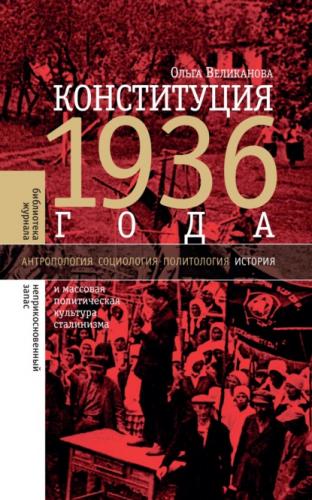9
Figes O., Kolonitsky B. Interpreting the Russian Revolution: The Language and Symbols of 1917. New Haven, CT: Yale University Press, 1999. P. 122–123, 189.
10
Lewin M. The Making of the Soviet System: Essays in the Social History of Interwar Russia. London: Methuen, 1985. P. 274, 304–311, 314.
11
Seregny S. J. A Different Type of Peasant Movement: The Peasant Unions in the Russian Revolution of 1905 // Slavic Review 1988. № 47 (1). P. 51–67; Куренышев А. А. Всероссийский Крестьянский Союз, 1905–1930 гг.: Мифы и реальность. М.: Дмитрий Буланин. 2004; Великанова О. Разочарованные мечтатели. Советское общество 1920-х гг. М.: РОССПЭН, 2017. Гл. 4.
12
Субъектность в философии и социологии – это способность человека выступать агентом (субъектом) действия, быть независимым от других людей. Поведение субьекта не полностью детерминировано условиями его непосредственного окружения и ассоциируется с самодетерминацией и личностной автономией.
13
Beetham D. Max Weber and the Theory of Modern Politics. Cambridge, UK: Polity, 1985. P. 194–198.
14
Medushevsky A. Russian Constitutionalism: History and Contemporary Development. Hoboken, NJ: Routledge, 2005. P. 156, 187, 241.
15
David-Fox M. Crossing Borders: Modernity, Ideology, and Culture in Russia and the Soviet Union. Pittsburgh, PA: University of Pittsburgh Press, 2015. P. 44, 94.
16
«Идеология как репрезентация» в терминологии Добренко. См. статью: Dobrenko E., Savage J., Olson G. Socialism as Will and Representation, or What Legacy Are We Rejecting? // Kritika: Explorations in Russian and Eurasian History. 2004. Vol. 5. № 4. P. 675–708, и его работы о соцреализме. Об элементах перформанса в культуре также говорил Джеффри Брукс: Brooks J. Thank You, Comrade Stalin! Soviet Public Culture from Revolution to Cold War. Princeton, NJ: Princeton University Press, 2000.
17
Yurchak A. Everything Was Forever, Until It Was No More: The Last Soviet Generation. Princeton, NJ: Princeton University Press, 2005. P. 12, 21.
18
Rose R., Mishler W., Munro N. Popular Support for an Undemocratic Regime. P. 3–15.
19
Исследование демократического движения 1985–1991 годов, проведенное Лукиным на основе качественных методов, показывает, что в России эпохи Горбачева отсутствовали необходимые культурные предпосылки для успешной демократизации (см. главу 13): Lukin A. The Political Culture of the Russian ‘Democrats’. Oxford: Oxford University Press, 2000.
20
Bullard R. W. Inside Stalin’s Russia: The Diaries of Reader Bullard, 1930–1934 / Ed. by J. Bullard and M. Bullard. Charlbury, Oxon, 2000. P. 258.
21
Богатыренко З. С. Обзор документальных материалов по истории создания конституции СССР, 1936 г. // Исторический архив. 1959. № 2. С. 197–205; Ронин С. А. Конституция СССР 1936 года. М.: Госюриздат, 1957; Третьяков Г. Ф. Всенародное обсуждение проекта Конституции СССР // Вопросы истории. 1953. № 9. С. 97–102; Кабанов В. В. Из истории создания Kонституции СССР 1936 года // История СССР. 1976. № 6. С. 116–127.
22
Siegelbaum L., Sokolov A. Stalinism as a Way of Life. New Haven, CT: Yale University Press, 2004; Davies S. Popular Opinion in Stalin’s Russia: Terror, Propaganda and Dissent, 1934–1941. Cambridge: Cambridge University Press, 1997; Goldman W. Z. Terror and Democracy in the Age of Stalin. Cambridge: Cambridge University Press, 2007.
23
Getty J. A. State and Society under Stalin: Constitutions and Elections in the 1930s // Slavic Review 1991. № 50 (1). P. 18–35.
24
Almond G. A., Verba S. The Civic Culture: Political Attitudes and Democracy in Five Nations. Boston: Little, Brown, 1965.
25
Nérard F.-X. Stalinism as Traditional Political Culture // Kritika: Explorations in Russian and Eurasian History. 2016. № 17 (2). P. 475–482; Martin T. Modernization or Neo-Traditionalism? Ascribed Nationality and Soviet Primordialism // Stalinism: New Directions / Ed. by Sheila Fitzpatrick. London: Routledge, 2000. P. 348–76; Lewin M. The Making of the Soviet System; Getty J. A. Practicing Stalinism: Bolsheviks, Boyars, and the Persistence of Tradition. New Haven, CT: Yale University Press, 2013.
26
Almond G. A., Verba S. The Civic Culture. P. 19.
27
Ibid. P. 23.
28
Viola L. Popular Resistance in the Stalinist 1930s: Soliloquy of a Devil’s Advocate // Kritika: Explorations in Russian and Eurasian History, Slavica Publishers. Vol. 1. № 1. Winter 2000. P. 45–69; Velikanova O. Berichte zur Stimmungslage: Zur den Quellen politischer Beobachtung der Bevolkerung in der Sowjetunion // Jahrbucher fur Geschichte Osteuropas 1999. № 47 (2). P. 227–243; Holquist P. ‘Information Is the Alpha and Omega of Our Work’: Bolshevik Surveillance in Its Pan-European Context // The Journal
